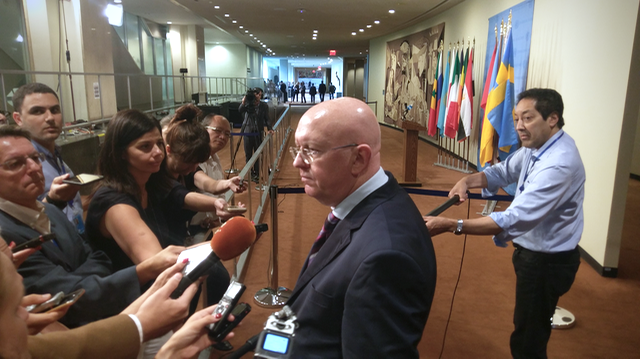Remarks to the press by Ambassador Vassily Nebenzia, Permanent Representative of the Russian Federation to the United Nations following the Security Council consultations on Syria
Q: Is there any update on a chemical weapons briefing and where you stand on it?
A: We had a chemical weapons briefing. High Representative Nakamitsu briefed us on the latest developments. Everyone was acknowledging that there is a progress on Syrian chemical demilitarization. Especially now that the last two chemical objects are accessible to inspect. They were not accessible due to the situation in the country which is emerged in crisis as you know. We discussed the work of the Joint Investigative Mechanism (JIM) that should follow up on the Fact-Finding Mission’s conclusions that, frankly speaking, we were not content with. We do not believe in “remote sense” which FFM exercised in conducting that investigation. We all confirmed total unacceptability of chemical weapons using in any part of the world by whoever did it. We stressed the need for objective investigation to be completed by JIM.
Q: Were you satisfied at all with what you have heard about the way that JIM investigation is going? I mean Russia has been very critical of the JIM findings previously.
A: We were critical primarily about the Fact-Finding Mission. We insisted that JIM would fill the gaps that the FFM investigation left. I met the JIM Head Edmond Mulet recently and I was inspired by his willingness to work towards conducting objective investigation and then providing a report that would finally tell us who the perpetrators were.
We welcomed his intentions to work with the Syrian Government and to visit Damascus and we encourage him strongly to visit the sites, without which the results of investigation won’t be complete.
Q: Ambassador, about Syria. Today Israeli satellite released pictures of a factory of Scud missiles and they claim that it was inside Syria near Latakia and it is run by Syrian Government basically producing Scud missiles. Did these things come up at the Security Council?
A: I read this story, you should ask those who provided it: Israelis and the Syrians. I have no information on this except that I read the article.
Q: What about ISIS accountability. Today Iraq Foreign Minister sent a letter to Secretary-General asking for international community’s help and to collect evidence of ISIS crimes in Iraq. There should be a vote on this resolution, which is just being drafted by Iraq and the United Kingdom. Could you tell us your country’s position on this?
A: We would support investigating crimes, perpetrated by ISIS. But we have to see the draft.
Q: Russia and others had said that Security Council is not a place for discussing the Venezuela internal issues. Following Donald Trump’s remarks on Friday, I mean possible military intervention, do you think this is the issue to discuss within the Council?
A: I don’t think so. Many countries including Russia commented on admissibility of any military solution in Venezuela and stressed the need for a dialogue which is in our view slowly evolving in the country. So, we don’t think there is something to discuss.
Q: Another follow up on DPRK. Joint U.S.-South Korea military exercises starts on Monday. It is another potential flashpoint in this crisis. What is Russia saying to North Korea to try to make them not to react?
А: We are telling both sides that they should refrain from anything that could deteriorate the situation. We have heard and seen some conciliatory language recently, in the last couple of days, and that is a good sign that things are cooling down. We are stressing that there is a need for a political way out of it. You possibly have heard SG’s comments on this situation today during the press briefing which we very much welcome. SG also stressed the need for a political diplomatic solution. We need political road map. For the time being there is only one on the table – Joint Russian-Chinese Statement of July 4th proposing dual suspension and the road map on the peace and security architecture in the Northeast Asia.
On the suspension – it was our Foreign Minister S.Lavrov who commented on the legality of things. It is not the time to discuss the legality, it is time to demonstrate that the parties are willing to move. In my humble view at least the reduction of intensity and the scale of exercise, if they are not cancelled at all might help relieve those tensions.
Q: Question on Iran nuclear deal. What is Russia doing to try to convince both parties to stay in the deal?
А: Again, there was a comment by our Foreign Minister today that the deal was a very delicate balance which is very easy to break, something we wouldn’t like to see. We would like the JCPOA (The Joint Comprehensive Plan of Action) remain. That’s one of the examples that the international community can take as an asset in recent times. It’s a delicate and very balanced agreement which is easy to break, so we have to stick to it, and not to make moves that would push one party or another to think about leaving it.
Q: Did you discuss at today’s meeting the allegations of the Syrian government about possible deliveries of chemical components?
А: No, we didn’t. I read the news recently, but we didn’t discuss it.
Q: Do you think it’s a violation of the Chemical Weapons Convention?
А: Yes, it is, of course. But we have to see the confirmation.
Q: Confirmation by the JIM? Should JIM deal with it?
А: We just read about it. We didn't discuss it, we didn't comment on it. If that is the case, it is in the mandate of JIM, too.
